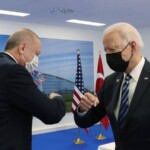Trade between Egypt and Turkey is estimated at $8 billion, a relatively limited figure that could triple or more given Egypt’s ambition to enhance its industry and attract new investments into its damaged economy. For Turkey, renewing relations could position it more strongly as a regional gas hub, serving as a conduit for Egyptian and Israeli gas on top of gas from Russia and countries on the Caspian Sea to go to Europe.
The simultaneous announcements on Tuesday (July 4th, 2023) by Ankara and Cairo trumpeting the resumption of full diplomatic relations between the two countries came as no surprise. For over a year the states have conducted 1ghy2tgtconsultations, conversations and visits with the aim of healing the bitter rift that erupted in 2013 following the seizure of power in Egypt by Abdel Fattah al-Sissi.
The clearest public sign of the developing normalization came last year in Doha when the Egyptian president and his Turkish counterpart, Recep Tayyip Erdogan, shared a cordial handshake at the World Cup. The Qatari emir, Sheikh Tamim bin Hamad Al Thani, served as the occasion’s “honest broker.” As between Israel and Turkey, whose diplomatic rupture began in 2010 in the wake of the Turkish flotilla incident, the Egypt-Turkey breakdown of ties was not total.
While bilateral trade sagged for three years after diplomatic relations were severed, it never stopped. Turkish products made their way into Egyptian markets, and Turkish merchants continued to import raw materials from Egypt. But outwardly, the war between the countries was in full swing.
Egyptians boycotted Turkish Airlines and the trade agreement between Ankara and the government of Mohammed Morsi – the Muslim Brotherhood member who was elected president in 2012 in Egypt’s first democratic election in 50 years – was canceled along with planned joint military maneuvers. Diplomatic ties were downgraded, the ambassadors were sent home, and toxic rhetoric ran rampant in media outlets in both countries.
For years, Erdoğan called Sissi’s move an “illegal coup d’etat” and the president himself an “illegitimate dictator.” He demonstrated his support for the Muslim Brotherhood at every opportunity and later granted asylum to its Egyptian leaders, allowing them to conduct a political and media campaign against the Egyptian regime from Turkey. Sissi did not take this lying down.
Saudi Arabia and the UAE, which opposed the Arab Spring and saw in Sissi the brake that could prevent it from spreading to their countries, not only provided him with enormous financial support.
They also punished Ankara, showing solidarity with Sissi by canceling investments in Turkey worth billions of dollars. Moreover, they targeted Turkey as the Arab world’s enemy. The UAE ambassador in Washington even called Turkey “a regional threar more serious than Iran.”
Sissi’s policy toward Erdoğan wasn’t substantially different from that of his predecessor, Hosni Mubarak, who viewed Turkey as a threat to Egyptian hegemony and its standing in the Middle East, and the feeling was mutual.
In February 2011, on the eve of Mubarak’s fall, it was Erdoğan who called on him to listen “to the shouting of the people” and “satisfy the people’s desire for change.” Erdoğan offered Mubarak “a very sincere piece of advice” during a speech to the Turkish parliament. “No government can survive against the will of its people,” he said. “The era of governments persisting with pressure and repression is over … All of us are mortals; transient. All of us will die and will be judged on what we have done.”
But Erdogan, who described himself as a supporter of the revolution and a friend of the oppressed, didn’t hesitate to support Iranian President Mahmoud Ahmadinejad, who won in a rigged election, the tragic results of which became known after Iranian security forces brutally repressed masses of protesters.
Another close friend of his is Omar al-Bashir, Sudan’s dictator, whose hands are soaked in the blood of the tens of thousands of people murdered by his gangs. At the same time, in early 2011, Syrian dictator Bashar al-Assad was also like a brother to him. Only a year after the civil war erupted, after tens of thousands of Syrian civilians were killed, did Turkey cut off relations with Syria.
Erdoğan had more advice for Egyptian citizens, and especially for the Muslim Brotherhood: Follow Turkey’s lead, and build yourself a secular republic with religious leadership, Erdogan advised when he paid his first visit to Egypt after the 2011 revolution. It was, however, a mistake that nearly cost him his relationship with the Muslim Brotherhood.
They wanted a full-blown religious state, neither Ottoman style nor Turkish style, and they certainly didn’t want to hear from him how to run Egypt. They settled their ideological disputes immediately, and Egyptian President Morsi quickly signed comprehensive trade deals with Turkey. He let Turkey use Egyptian ports as a bridgehead to Africa and discussed military cooperation. The trade deals and joint military maneuvers were canceled, as noted, with Sissi’s rise to power exactly a decade ago.
Beyond the personal hostility between the two leaders and the permanent tension between them due to Turkey’s support for the Muslim Brotherhood (which it agreed to significantly reduce in order to renew relations with Egypt), two major theaters of confrontation have opened between Turkey and Egypt that have sometimes threatened to become real wars.
One is in Libya, where Turkey, Qatar and Italy have offered military and economic aid to the recognized government against the separatist general Khalifa Haftar, who is backed by Egypt, the United Arab Emirates, Russia and France. Egypt prefers an alliance with Haftar, who controls the eastern part of the country after having successfully fought the Islamic State and other radical Islamist groups. He can therefore ensure, even if not completely, that eastern Libya won’t serve as a springboard for sending radical Islamist forces across the border into Egypt.
Haftar allowed Egyptian and Emirati ground and air forces to operate almost unrestrictedly in eastern Libya. In exchange, he received arms shipments, money and diplomatic backing intended to help him take over the country’s government, though he has so far failed to do so.
In contrast, Turkey sent ground and air forces to help the Libyan government fight Haftar’s forces. It even sent Syrian “volunteers” from the rebel militias who fought against Syrian President Bashar Assad.
Turkey’s backing of the Libyan government produced huge economic and diplomatic benefits when, in 2019, the two countries signed an agreement demarcating the boundaries of their exclusive economic zones. Under this agreement, and another signed two years later, Turkey received vast tracts of the Mediterranean Sea containing reserves of oil and natural gas that it can pump.
The demarcation of this border upset the entire network of natural gas production in the eastern Mediterranean, since according to the Turkish-Libyan map, Turkey’s exclusive economic zone includes part of the area between Greece and Egypt, which could undermine Egypt’s ability to sell gas directly to Europe.
Granted, Turkey said there was no obstacle to Egyptian gas going through Turkey to Europe, thereby bolstering Turkey’s position as a regional transit hub for natural gas. But from Egypt’s standpoint, this was almost a declaration of war. Ironically, while the Turkish and Egyptian governments were facing off over the maritime border agreement, Egypt began selling gas directly to Turkey. By last year, Turkey had become Egypt’s biggest gas customer.
The second theater relates to the Renaissance Dam that Ethiopia is building on the Nile River, which Egypt claims threatens its security and economy. It was, therefore, upset about the defense cooperation agreements Ankara signed with Addis Ababa in 2021. These included Turkish shipments of weapons and drones; intelligence cooperation, including in the cyber realm; Turkish training for Ethiopian forces; and also investments in civilian projects that totaled $2.5 billion (as of 2021).
Back in 2014, Egypt agrgressively warned Turkey not to interfere in the Egyptian-Ethiopian dispute over the dam. “When Turkey built the Ataturk Dam in violation of international agreements, it caused a drought among residents of Syria and Iraq,” Egypt’s water minister at the time, Mohamed Abdelmotaleb, said. “I want to stress that Egypt isn’t Iraq or Syria, and Ethiopia isn’t Turkey.”
This aggressive language has since been toned down, but just like its relationship with Libya, Turkey’s relationship with Ethiopia will be at the top of the bilateral agenda for renewing diplomatic relations.
Turkey and Egypt have undergone similar processes over the last two years of reorganizing their foreign relations. Renewing ties with the UAE, Saudi Arabia, then Israel and now Egypt completes Turkey’s return to the Arab Middle East. This time, it does so as a partner, this time at least refraining from a demonstration of hegemonic ambitions. All that remains is to end the rift with Syria, which it is taking pains to do together with Russia.
Egypt renewed relations with Qatar, after waging a four-year siege with three other Gulf states. It facilitated Syria’s return to the Arab League, softened its position toward the Libyan government, and now is examining the possibility of renewing its ties with Iran, too. This moment seems ripe for that move after Saudi Arabia and Iran renewed diplomatic relations in March.
These steps are not the result of a belated love or an expression of strategic or military alliances intended to transform the world or region. Egypt and Turkey are both knee-deep in economic crises, which at least in Egypt’s case threaten regime stability. The new deals aim to refill the empty coffers both countries.
Trade between Egypt and Turkey is estimated at $8 billion, a relatively limited figure that could triple or more given Egypt’s ambition to enhance its industry and attract new investments into its damaged economy. For Turkey, renewing relations could position it more strongly as a regional gas hub, serving as a conduit for Egyptian and Israeli gas on top of gas from Russia and countries on the Caspian Sea to go to Europe. Now, all it has to do is fulfill that dream.
This article was originally published by Haaretz.
The views and opinions expressed above are the author’s and do not reflect those of the Free Turkish Press.


